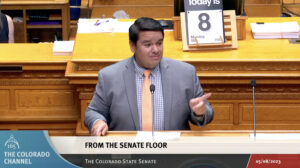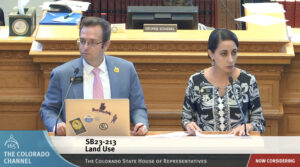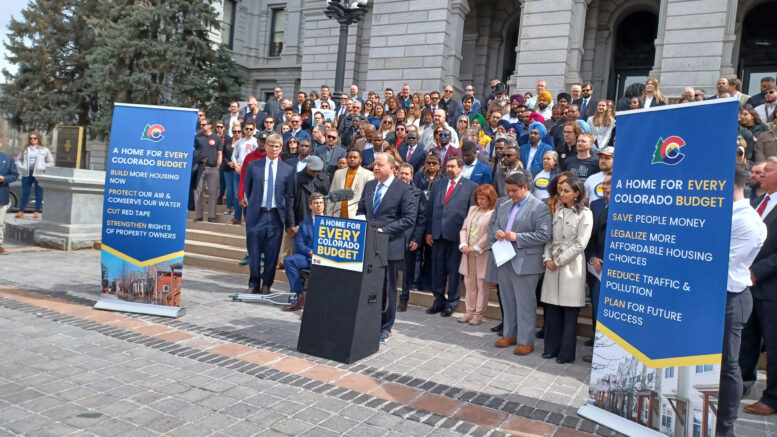An ambitious bill to reform Colorado land-use codes to spur construction of more housing along key corridors and throughout cities died on the final day of the 2023 legislative session, a casualty of key Democrats’ inability to agree on whether the state should pre-empt local laws.
With the move Monday, which came via an admission of defeat from Gov. Jared Polis rather than a vote on the bill that ended up dying on the Senate calendar, the Democratic governor missed on what he had called his top priority of the session. The Legislature did pass a companion bill that bars cities from implementing or enforcing growth caps like those that are in place in Boulder, Golden and Lakewood, but that proposal’s ability to spur more housing pales in comparison to what was lost in Senate Bill 213.
Polis press secretary Conor Cahill said in a statement that the governor remains “deeply committed” to seeking solutions to the affordable-housing crisis and to removing costly barriers to housing. But the defeat was especially surprising given that Polis was working with the biggest Democratic majority in Colorado history — 46 of the 65 House members and 23 of the 35 senators — and rolled out his housing package in March with a large coalition of supporters.
“Governor Polis will continue his fight to better protect the property rights of homeowners and make Colorado more affordable to purchase or rent homes because changing the status quo isn’t easy,” Cahill said. “He is deeply disappointed that politics and special interests continue to delay delivering real results for aging Colorado seniors who want to downsize, young families who want to live close to their work and the communities where they grew up and businesses struggling with workplace shortages because of artificially high housing costs.”
Part of a rancorous final day of session
The failure to pass SB 213, sponsored by Democratic Senate Majority Leader Dominick Moreno of Commerce City, was one of many surprises on a tumultuous final night of the legislative session. House Republicans walked out of their chamber over Democratic moves to limit debate on a property-tax relief proposal funded partially by Taxpayer’s Bill of Rights refunds, and a Democratic legislator filed a formal protest over a bill involving casinos’ credit lines that House Speaker Julie McCluskie allowed to be reconsidered and passed.
But the sudden end for SB 213 was most surprising because the idea it put forward — removing obstacles to construction of new homes to boost competition and affordability at a time when Colorado is some 117,000 units short of need — was one that got bipartisan support. Fights over details in the bill, particularly how intrusive the state government should be to the existing system leaving land-use decisions solely to local governments, ultimately doomed the bill.
As introduced, SB 213 sought to allow the owner of any property zoned for single-family housing in urban or rural-resort areas to build units ranging from duplexes to six-plexes on the land and to add accessory dwelling units as uses by right. It also would have established statewide minimum density standards for key corridors and transit-oriented communities in those areas, required a statewide housing-needs assessment and banned local laws limiting the number of occupants in a home or discriminating against modular housing.

Colorado Senate Majority Leader Dominick Moreno speaks on the floor of the chamber on Monday.
Polis and Moreno ran into an immense wave of opposition from municipal officials decrying the state’s proposed usurpation of local control, and Moreno first removed the allowance for “middle housing” on single-family plots and then struck all pre-emptions of local law. But when the bill passed the Senate and arrived in the House, its sponsors in that chamber reinserted the language allowing for ADUs and requiring greater density along high-traffic corridors, saying they must address a crisis causing both economic and environmental problems.
An ultimate chasm for housing bill
However, there were enough Democrats in the Senate who agreed with Republicans that they did not want to allow the state government to take away local land-use decision-making. And when House and Senate leaders on the bill sought to find some area of common ground that they could hash out in a conference committee, they were not able to do so, leaving the two sides far enough apart that there was no path forward for the bill.
Advocates for the bill immediately began tweeting for Polis to call a special session to bring legislators back to the Capitol to find a solution. But there was no indication that such a move is planned or that, ever were a special session to happen, either side would be able to move enough to agree either to some measure of statewide land-use rules or to investments in state and local housing-needs assessments and a committee run by the Department of Local Affairs to help cities address housing and displacement needs.
Kevin Bommer, the Colorado Municipal League director who led the fight against the pre-emptions in SB 213, said that he believes its high-profile death can create an opportunity to regroup housing advocates, environmental organizations and municipal leaders and spend the next eight months discussing a way to address the housing crisis with more consensus. Any such talks would come as the state begins the process of doling some $300 million a year that is available under Proposition 123, an initiative statewide voters approved in 2022 to take excess state revenues and put them to affordable-housing grants.
“As proponents often pointed out, Colorado municipalities are doing this work on the local level but wish for a strong partnership with the state to leverage resources and local land-use expertise,” Bommer said in a statement.
New discussions soon to begin
About the only thing certain is that legislators aren’t going to let the defeat this year stop them from discussing how to increase affordable housing. Colorado has become one of the most expensive states in America to live, and that is causing employers to have a harder time finding and keeping staff when those workers aren’t able to afford living close to their jobs.

Colorado state Reps. Steven Woodrow and Iman Jodeh explain their land-use reform bill to the House.
Rep. Steven Woodrow, the Denver Democrat who co-sponsored SB 213 in the House, said he will continue to make the case that land-use issues are state issues while a lack of housing restricts the state’s economic growth. While Woodrow agrees there are some areas that a statewide housing bill shouldn’t touch — he led the pushback against an unsuccessful amendment in the House on Thursday to require inclusionary zoning of key and transit-oriented corridors — he also argued that the concepts in the bill are about private-property rights.
“Opponents say we need to retain absolute local control, and some have even promised lawsuits,” Woodrow said during debate in the House. “If local control was the answer, we wouldn’t have a statewide crisis.”
SB 213 joins several other housing bills the Senate rejected this year, including a proposal to allow local governments to impose rent-control laws, a measure to restrict reasons that landlords could evict tenants and a bill that would have clamped down on a popular method of financing metro districts to build new communities.
In addition to the growth-limits bill, the Legislature did pass bills this year to give local governments a right of first refusal on many apartment complexes that go up for sale and to limit the size of deposits that landlords can charge to renters. After some significant changes in the Senate on Saturday, the right-of-first-refusal bill, House Bill 1190, squeaked out of the Senate Sunday on a 19-16 vote and then repassed the House Monday by a 41-20 margin.
